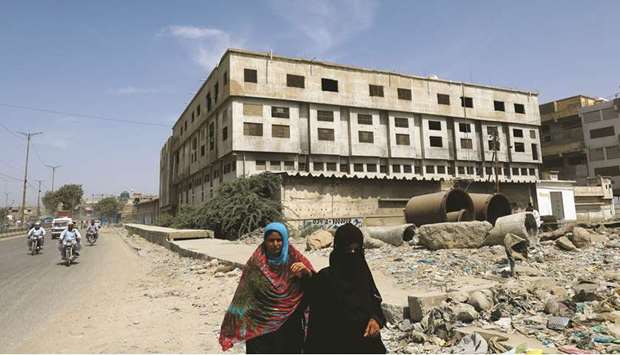Two men have been sentenced to death for starting a fire at a garment factory that killed more than 260 people in 2012.
A Karachi court found Mohamed “Chariya” Zubair and Abdul “Bhola” Rehman guilty of arson, ruling that the pair intentionally set the Ali Enterprises factory ablaze after the owner refused to pay a bribe.
Arshad Bhaila, one of the owners of the factory, had testified in court that the two men had asked him to pay Rs250mn or a 50% share of the factory’s profits.
He said he had been willing to pay Rs10mn.
In what was considered a largely symbolic gesture, the court sentenced Zubair and Rehman to 264 separate death sentences, along with life imprisonment.
“I am satisfied with the court’s verdict as it has awarded them very appropriate sentences,” public prosecutor Sajid Mehboob Sheikh told AFP.
The fire at Ali Enterprise, a multi-storey unit for readymade garment manufacturing in the southern city of Karachi, sent shockwaves through the country as survivors told of people trapped and killed behind locked factory doors.
Of the eight other people accused in the case, four were found complicit while the other four were acquitted, including the then-provincial minister for industries, Rauf Siddiqui, defence counsel Abid Zaman told reporters outside the court.
Siddiqui belongs to the Muttahida Qaumi Movement-Pakistan (MQM-P), a party that was frequently accused of assassinating political opponents, extorting businesses, and orchestrating strikes to cement its hold over the city, until an operation by security forces effectively crushed them in 2013.
A faction of the MQM-P is now a partner in Prime Minister Imran Khan’s coalition government.
Both Rehman and Zubair were MQM-P activists.
Also acquitted were Umar Hasan Qadri, Dr Abdul Sattar Khan, and Iqbal Adeeb Khanum.
Four others – Shahrukh, Fazal Ahmed, Arshad Mehmood and Ali Mohamed – were handed life sentences for facilitating the crime.
One key suspect, the then in-charge of the MQM’s Karachi Tanzimi Committee, Hammad Siddiqui, remains on the run.
The prosecution had argued in the case that he was the brains behind the extortion and the arson act.
As many as 400 witnesses gave statements in 171 hearings that spanned eight years.
While the MQM is part of the ruling coalition, the party broke up into several factions three years ago.
The current MQM leadership denies any involvement with the fire and says such activities were directed from abroad, where several important leaders live, including the founder of the party, Altaf Hussain, who lives in exile and is now a British citizen.
The party says it has cut all ties with Hussain.
Pakistan’s moratorium against the death penalty was lifted after a bloody Taliban attack on a school in Peshawar in 2014.
Since then the country has hanged hundreds, many of whom were linked to militancy.
Rehman fled Pakistan after the fire, but was arrested by Thai authorities at a hotel in Bangkok’s red-light district.
The fire, which at first was thought to have been an accident, is believed to have been the worst industrial disaster in the country’s history.
A judicial probe highlighted a lack of emergency exits, poor safety training for workers, and the failure of government inspectors as contributing to the high death toll.
Much of the factory’s output was being made for the German company KIK, who paid out over $6mn in compensation to families of the victims.

Women walk along a road in Karachi, with an abandoned building that housed a garment factory in the background, where more than 260 people died in a fire broke in 2012.
